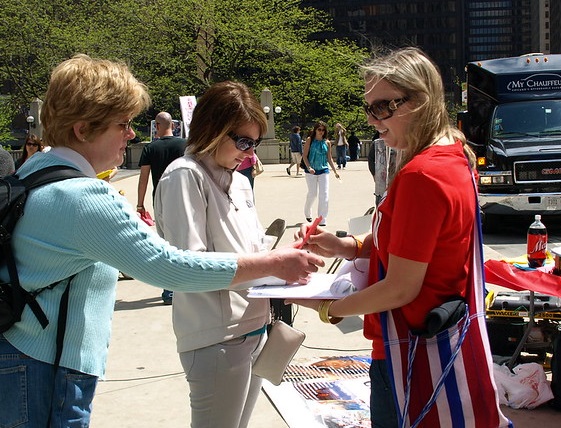
Petition Signing Pre-COVID Photo: Alan Chan (CC BY-NC-SA 2.0)
Feb. 22, 2021 By Christina Santucci
A Supreme Court justice is now weighing in on a lawsuit brought by more than 100 political candidates and their supporters — asking that the requirements to collect in-person signatures to get on the ballot be waived.
State Supreme Court Justice Frank P. Nervo presided over a hearing about the suit Monday, and said he plans to issue his ruling “as expeditiously as possible.”
- Petitioning to be on the ballot, which entails collecting signatures on designating petitions, is currently scheduled to start March 2, and those petitions have to be filed with the Board of Elections from March 22 to 25.
Political candidates must collect a threshold of signatures depending on which office they are running for, but they typically gather many more than needed in case the signatures are challenged by their opponents.
State officials reduced the number of signatures needed by about 70 percent in January — so mayoral candidates now need a minimum of 2,500. City Council candidates are now required to collect 270 signatures from registered voters who live in the district in order to appear on the ballot.
But a group of candidates said the lowered threshold still puts people at risk of spreading COVID-19, and filed a lawsuit against Gov. Andrew Cuomo and Mayor Bill de Blasio Feb. 8.
Council member Jimmy Van Bramer, who is running for Queens borough president, as well as 11 candidates seeking Queens council seats are among the plaintiffs.
The lawsuit argues that the requirement to gather in-person signatures is unconstitutional, claiming that it puts people’s health at risk. The suit asks the court to direct state and city officials to figure out an “alternative, constitutionally sound method” for candidates to be placed on the ballot.
On Monday, attorney and Manhattan Council candidate Arthur Schwartz presented their case during a virtual hearing. He argued that as many as 1,000 political candidates citywide may want to gather signatures this year, leading to numerous in person interactions.
“There is no way that you can collect petitions and stay six feet away from someone else,” he said.
Assistant Attorney General Eva L. Dietz represented Cuomo, and Stephen Kitzinger, senior counsel in the New York City Law Department, appeared on behalf of de Blasio.
Schwartz suggested that petitioning could be done virtually, or officials could certify candidates who had reached the threshold needed to receive matching funds from the city’s Campaign Finance Board.
In a back-and-forth discussion, Justice Nervo questioned Schwartz about whether signatures could be gathered in person safely, citing protective measures that are used in banks and stores.
“There are ways for people to protect themselves during these short interactions,” he said.
Schwartz responded that safety measures would burden candidates, and the requirements — as is — would force each candidate and their supporters to approach hundreds of people.
“That’s a lot more than going to the store to buy bananas,” he said.






